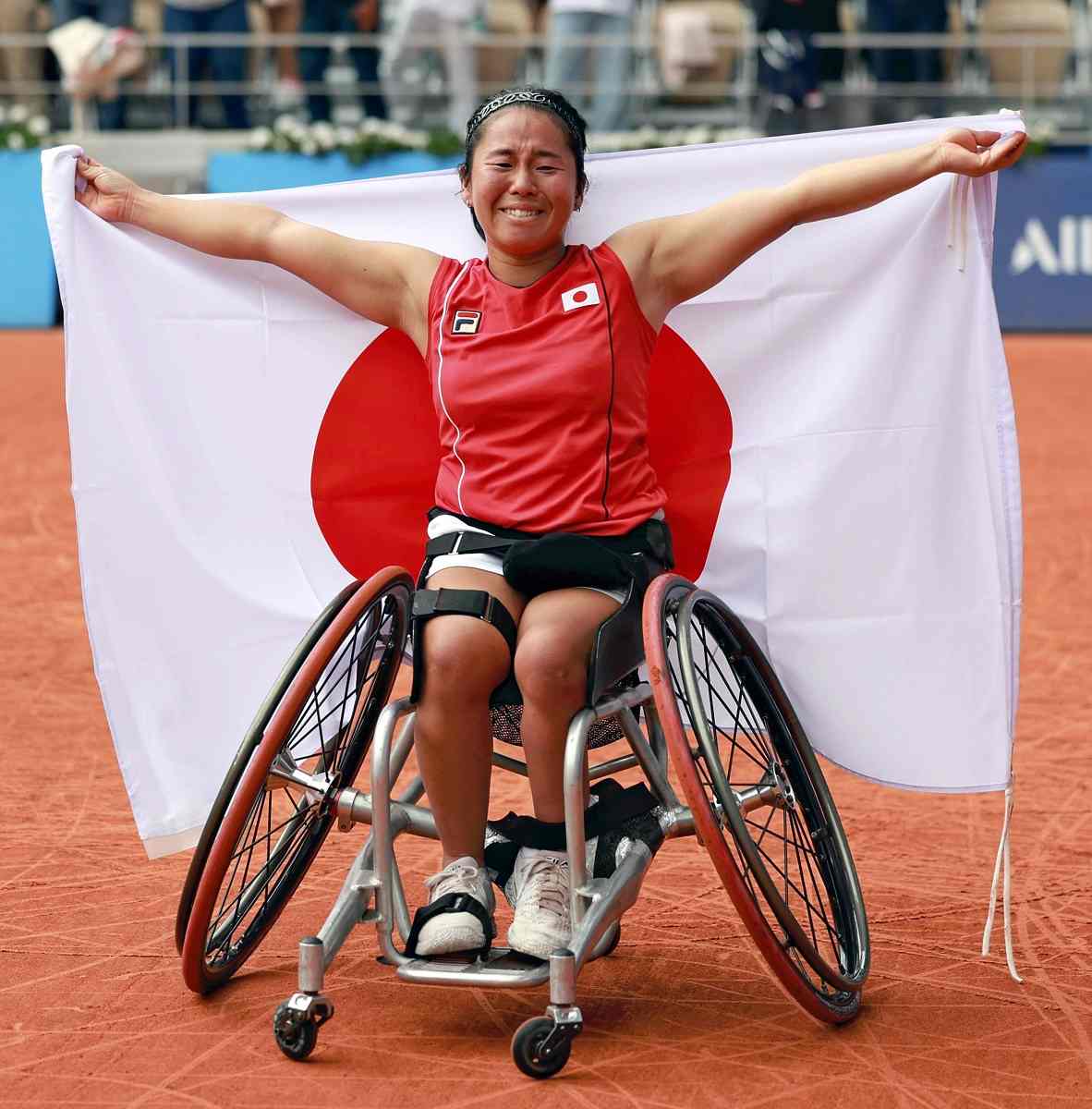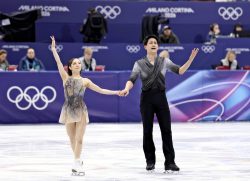Yui Kamiji’s Evolution Into A Wheelchair Tennis Gold Medalist; Athlete’s Development of Speed and Technique Pay Off in Victory over Dutch Champion

Yui Kamiji raises the Japanese flag after winning the Paris Paralympics women’s wheelchair tennis singles gold medal in Paris on Friday.
15:03 JST, September 7, 2024
PARIS — Yui Kamiji, who won the gold medal in the women’s singles wheelchair tennis event at the Paris Paralympics on Friday, showed how she had evolved by the speed of her movements.
Kamiji’s triumph ended a streak of eight consecutive gold medals for the Netherlands in wheelchair tennis at the Paralympics.
On the previous day, she had also claimed women’s wheelchair tennis doubles gold with Manami Tanaka, defeating the Dutch pair.
She covered her face and cried at the moment of victory, and she could hardly hold back her emotions at the award ceremony where she received the gold medal.
Kamiji became the first Japanese woman to win both the singles and doubles wheelchair tennis matches.
She was delighted to win her rematch against defending champion Diede de Groot of the Netherlands, who had beaten her for gold at the Tokyo Paralympic Games three years ago.
Kamiji said, “I fought to the end and didn’t give up. Because I kept going, I got a good chance, and I took it.
“[At the Tokyo Games,] I could not keep up with [de Groot’s] speed, and there were times when I didn’t even know where I was,” she added.
Kamiji’s specialty is buying time and using it to precisely exploit her opponents’ weak points. However, over the past three years, she has honed her technique to play fast-paced tennis, which she had keenly felt the need to do at the Tokyo Games.
She learned how to change her own pace with the right timing while hitting together with a team.
Kamiji also sought to boost her mobility by making the wheelchair lighter and more in tune with her body by, for example, lowering the seat surface so that she could pedal with the tires for longer periods.
She tried out a variety of new approaches so that there would not end up being anything she regretted not having done.
She enjoyed taking on these challenges as she improved her skills, which she described as making her feel “like I did when I didn’t know how to hit a ball or control a wheelchair.”
The last several years have been a long, step-by-step climb for her: she competed at the London Paralympics but did not medal; she won a bronze at the Rio Games and silver in Tokyo. At last it seems that she has reached the top.
Top Articles in Sports
-

Milano Cortina 2026: Figure Skaters Riku Miura, Ryuichi Kihara Pair Win Gold; Dramatic Comeback from 5th Place in SP
-

Milano Cortina 2026: Kokomo Murase Comes Out on Top After Overcoming Obstacles, Aiming for Greater Heights in Competition
-

Milano Cortina 2026: Riku Miura, Ryuichi Kihara Clinch Japan’s 1st Gold in Pairs Figure Skating, Rebounding from Disappointing Short Program
-

Milano Cortina 2026: Olympics-Torch Arrives in Co-Host Cortina on Anniversary of 1956 Games
-

Milano Cortina 2026: Japan’s Athletes Arrive in Italy for Milano Cortina Winter Olympics; Other Athletes to Arrive from Now
JN ACCESS RANKING
-

Japan PM Takaichi’s Cabinet Resigns en Masse
-

Japan Institute to Use Domestic Commercial Optical Lattice Clock to Set Japan Standard Time
-

Israeli Ambassador to Japan Speaks about Japan’s Role in the Reconstruction of Gaza
-

Man Infected with Measles Reportedly Dined at Restaurant in Tokyo Station
-

Videos Plagiarized, Reposted with False Subtitles Claiming ‘Ryukyu Belongs to China’; Anti-China False Information Also Posted in Japan






















